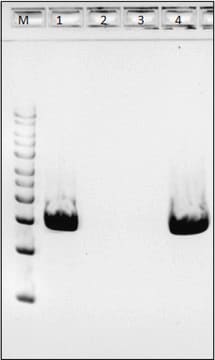A3547
Achromopeptidase from bacteria
lyophilized powder, ≥1,000 units/mg solid
Synonym(s):
ACP, Lysyl endopeptidase
About This Item
Recommended Products
biological source
bacterial (LYSOBACTER SP. BACTERIA M497-1)
Quality Level
form
lyophilized powder
specific activity
≥1,000 units/mg solid
mol wt
27 kDa
technique(s)
cell based assay: suitable
suitability
suitable for cell lysis
application(s)
diagnostic assay manufacturing
shipped in
dry ice
storage temp.
−20°C
Application
Biochem/physiol Actions
pH Optimum for activity: pH 8.5 - 9
Approximately 500-1,500 un/ml achromopetidase can be used to lyse cells at a density of OD600=0.6 over 2 hours at 37 °C.
Unit Definition
Physical form
Signal Word
Danger
Hazard Statements
Precautionary Statements
Hazard Classifications
Resp. Sens. 1
Storage Class Code
11 - Combustible Solids
WGK
WGK 3
Personal Protective Equipment
Certificates of Analysis (COA)
Search for Certificates of Analysis (COA) by entering the products Lot/Batch Number. Lot and Batch Numbers can be found on a product’s label following the words ‘Lot’ or ‘Batch’.
Already Own This Product?
Find documentation for the products that you have recently purchased in the Document Library.
Customers Also Viewed
Protocols
To measure achromopeptidase activity, this procedure uses bacterial cells and a turbidimetric rate assay. Turbidity is measured at 600 nm using a spectrophotometer.
To measure achromopeptidase activity, this procedure uses bacterial cells and a turbidimetric rate assay. Turbidity is measured at 600 nm using a spectrophotometer.
To measure achromopeptidase activity, this procedure uses bacterial cells and a turbidimetric rate assay. Turbidity is measured at 600 nm using a spectrophotometer.
To measure achromopeptidase activity, this procedure uses bacterial cells and a turbidimetric rate assay. Turbidity is measured at 600 nm using a spectrophotometer.
Related Content
Find cell lysis and protein extraction reagents like cell lysis buffers, protein extraction kits, extraction enzymes, and other lysis enhancers for isolating and purifying proteins.
Find cell lysis and protein extraction reagents like cell lysis buffers, protein extraction kits, extraction enzymes, and other lysis enhancers for isolating and purifying proteins.
Find cell lysis and protein extraction reagents like cell lysis buffers, protein extraction kits, extraction enzymes, and other lysis enhancers for isolating and purifying proteins.
Find cell lysis and protein extraction reagents like cell lysis buffers, protein extraction kits, extraction enzymes, and other lysis enhancers for isolating and purifying proteins.
Our team of scientists has experience in all areas of research including Life Science, Material Science, Chemical Synthesis, Chromatography, Analytical and many others.
Contact Technical Service












